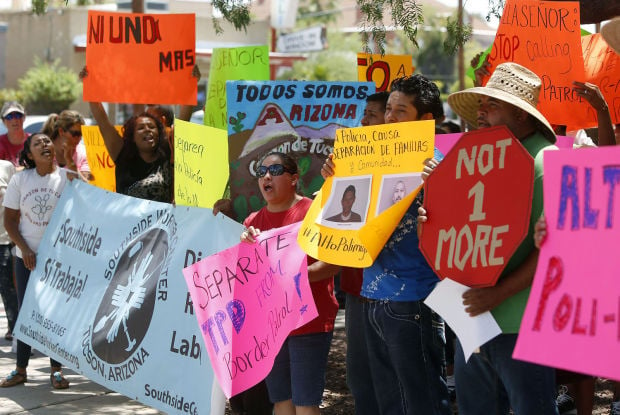The bill is dead, but the idea is not.
The idea — heard on local airwaves, at coffee shops and bars, and in the halls of the state Capitol — is that Tucson is a sanctuary city. It’s a place, the idea goes, where cops won’t call the Border Patrol, where the jail will let people free rather than hand them over to the hated Migra.
It’s a hot issue again because of something that happened last year in San Francisco, a recognized sanctuary city. A Mexican man was released from jail despite immigration authorities wanting him to be handed over to them. A couple of months later, on July 1, he randomly shot 32-year-old Kate Steinle on a pier. Rightful anger has resulted.
The idea that Tucson, too, is a sanctuary city was reinforced this month at the state Legislature, a place where if you testified that each Tucson home is required to have a copy of the Communist Manifesto, the legislators would believe it and shake their heads in disgust.
Zack Taylor, a Santa Cruz County man, got that sort of reception from the state Senate’s committee on public safety, military and technology Feb. 3. Giving a presentation on border threats, Taylor, a retired Border Patrol agent, intoned:
“The big threat to the state of Arizona is the sanctuary city policies that exist here. And I’m telling you I live and work in Tucson, Arizona, and I’ll tell you it is a sanctuary city.”
I’m not sure what Taylor meant when he said he lives here. He is, after all, the chairman of the Santa Cruz County Republican Party. But senators seemed prepared to believe him.
“Why do you say that?” Sen. Steve Smith, R-Maricopa, asked Taylor about the sanctuary city accusation.
“I’ve heard the chief of police that just recently retired saying that they don’t intend to assist the immigration authorities with picking up illegal aliens and getting them off the street,” Taylor said.
“Is this a written policy?” Sen. John Kavanagh asked.
“When the chief of police goes on TV and says it, it’s probably already a policy that’s been put out to the field officer,” Taylor responded.
In part on the strength of that inexpert testimony, the panel went ahead and passed a bill that would have taken away state tax money from any city shown to be a sanctuary city. Fortunately, the Senate shot down the bill by a 16-14 vote on Monday.
I say fortunately because it was really unnecessary. First, it’s questionable whether there are any sanctuary cities in Arizona. Second, there are already enforcement mechanisms left from SB 1070 if cities don’t follow state law.
Eliminating sanctuary-city policies was one of then-Sen. Russell Pearce’s main aims when he got SB 1070 passed. A rare portion of the bill not thrown out by federal courts says that officers must contact federal immigration authorities if they develop reasonable suspicion that a person they’ve detained or arrested is in the country illegally.
It’s true that Tucson officials such as recently retired chief Roberto Villaseñor and former Pima County Sheriff Clarence Dupnik fought the proposal, arguing it was unnecessary, potentially racist and could divide the police from residents. But in more recent years, the trouble Tucson police have faced has been for enforcing the law, not for avoiding it.
Repeatedly from 2012 through 2014, protesters gathered when Tucson police called U.S. Border Patrol agents about people suspected of immigration-law violations. One former local resident became notorious for crawling underneath the Border Patrol vehicle where arrestees were held to prevent them from being taken away.
Villaseñor opposed the law but said he was obliged to enforce it.
About a year ago, the city revised its general orders for police on immigration enforcement, narrowing the situations in which police will call federal authorities. Officers are now prohibited from asking crime victims or witnesses about their immigration status, and juveniles can be asked only in the presence of a parent or lawyer.
The debate over San Francisco’s sanctuary policy has focused more on its refusal to hand prisoners over to immigration authorities than on local arrest practices. In Pima County, Sheriff Chris Nanos said, the jail will alert immigration authorities when somebody they want is about to be released.
If the feds don’t pick him up, the jail releases him, Nanos said.
“If you’re law enforcement, you can’t hold somebody without probable cause or a warrant,” he told me Tuesday.
When I asked Shawn Moran, vice president of the National Border Patrol Council, how he defines a sanctuary city, Moran said, “I think the simplest definition is where local law enforcement does not cooperate with immigration officials by order of some policy.”
You could say some of our policies don’t encourage local police to eagerly cooperate with immigration officers. But a more strict definition would say no way is Tucson a sanctuary city.
The Center for Immigration Studies, a think tank that supports restricting legal and illegal immigration, defines sanctuary cities as those that “protect criminal aliens from deportation by refusing to comply with ICE detainers or otherwise impede open communication and information exchanges between their employees or officers and federal immigration agents.”
By that definition, last month the center only called one city in Arizona, South Tucson, a sanctuary city. And that was not because of a philosophical decision but because, as the center put it, South Tucson “will not honor ICE detainer unless ICE pays for cost of detention.”
Seems fair to me. And if that’s the worst we have to offer in Arizona, then it’s a good thing that bill was voted down.






